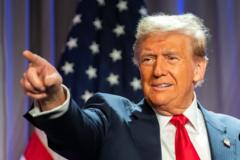In a surprising social media revelation, Donald Trump has declared an aggressive stance against BRICS nations, indicating he will resort to imposing 100% tariffs if they attempt to create a competing currency to the US dollar.
Trump's Bold Threats: 100% Tariffs on BRICS Nations Over Dollar Rivalry

Trump's Bold Threats: 100% Tariffs on BRICS Nations Over Dollar Rivalry
US President-elect's vow to impose steep tariffs highlights tensions with emerging economies.
Former President Donald Trump, poised to take office again on January 20, has issued a stark warning to the BRICS alliance—comprising China, Russia, Brazil, India, South Africa, Iran, Egypt, Ethiopia, and the United Arab Emirates—about the consequences of establishing a rival currency. "The idea that the BRICS countries are trying to move away from the Dollar while we stand by and watch is OVER," Trump asserted on his Truth Social platform this past Saturday.
In light of recent suggestions from key politicians like those from Brazil and Russia to potentially introduce a BRICS currency that could diminish the dollar's reign in international trade, Trump's strong words seem aimed at thwarting any such developments. He reminded the grouping that a lack of commitment to abandon plans for a new currency would result in dire financial repercussions: "They will face 100% tariffs and should expect to say goodbye to selling into the wonderful US economy," he asserted.
Notably, Trump's rhetoric aligns with his prior electoral promises to impose extensive tariffs as a means of protecting American jobs and preserving economic strength. His administration's approach to tariffs has drawn mixed responses, with allies hinting his threats may serve as strategic negotiating tactics rather than definitive policies. Senator Ted Cruz highlighted the effectiveness of tariff threats in eliciting action, referencing recent discussions with Canadian officials in an effort to avert potential levies.
His Treasury Secretary nominee, Scott Bessent, echoed similar sentiments, describing Trump as a 'free trader' whose threats might be part of an overarching strategy of "escalate to de-escalate." However, the mechanics of tariffs reveal complexities. While tariffs are positioned as beneficial to the US economy, they place a heavier burden on American consumers and local businesses that import goods, as these tariffs are ultimately paid by domestic companies rather than the foreign exporters.
Historically, Trump's prior term was marked by a myriad of tariffs, many of which are still enforced by current President Joe Biden. Economic analysis suggests that American consumers primarily bore the weight of these tariffs, raising questions about their long-term efficacy and acceptability.
As tensions remain heightened, the fates of international economic dynamics hang in the balance, underscoring the delicate interplay of power among nations in a rapidly changing global landscape.





















